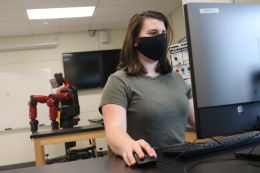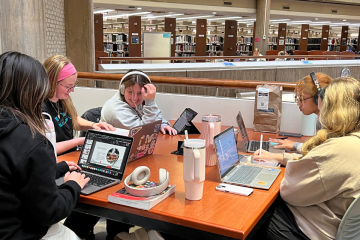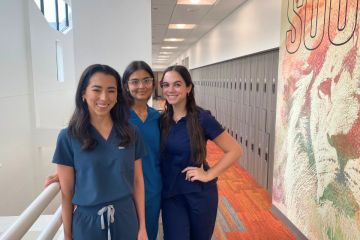Advancing Industries Through the Power of Robotics Automation

The power of technology has transformed industries across the globe. Innovative technologies are enabling companies and organizations to automate processes and address key issues at the industry level.
Robotics engineering student Emily Wolfe '22 is fascinated by this trend and ready to make a career out of it.
“Nearly everything is automated now which is good news for me,” said Wolfe.
The rising senior is working alongside Xiaomeng Shi, an assistant teaching professor, to design and test a mechanism that will automate corn retrieval from the field as part of an ongoing research project to study and improve soil quality.
While crop production has soared in recent years, finding crop varieties that efficiently utilize nutrients and water deeper in the soil is very challenging. Agricultural scientists and engineers are expanding technology applications to address these problems and advance the industry.
Wolfe is contributing to one of those advances this summer through student-faculty research as part of this year’s Summer Undergraduate Research and Creative Activities (SURCA) program.
According to Wolfe, the project’s focus is to improve “a mechanism that will grab corn roots out of the ground, then clean them off within the unit using a power washer, and then store them. It then brings them back to the university where they then create a 3D model and use that to help identify the corn roots to make them more sustainable.”
“The method that is used right now is manual. It is really time consuming and labor-intensive work so that is why this kind of tool is needed,” said Shi, who recently joined the engineering faculty from Penn State’s Department of Agricultural and Biological Engineering.
Their investigations will contribute to a multi-year, federally funded project led by Penn State that Shi was involved in as post-doctoral scholar.
The multifaceted project seeks to meet a series of objectives, such as studying how certain crops maximize the efficiency of utilizing nutrients and water in the soil. Shi and Wolfe’s work will allow corn to be collected more efficiently, which in turn will expedite testing and research.
Partnering with Widener faculty on research projects gives students an opportunity to dive into topics and get a deeper understanding of how their classroom applies to different specialties.
“It’s really good hands-on experience and gives me a better idea of the different applications of what robotics can do,” said Wolfe.
With guidance from Shi, Wolfe will move to the next phase of the project which includes creating an algorithm used by a 3D infrared camera to identify and measure root placement before corn is pulled out of the ground.
“In the next few weeks I’m going to work to improve the camera system and figure out how to eliminate the false positives such as rocks, weeds or others things that you might find in the field that aren’t corn roots,” said Wolfe.




